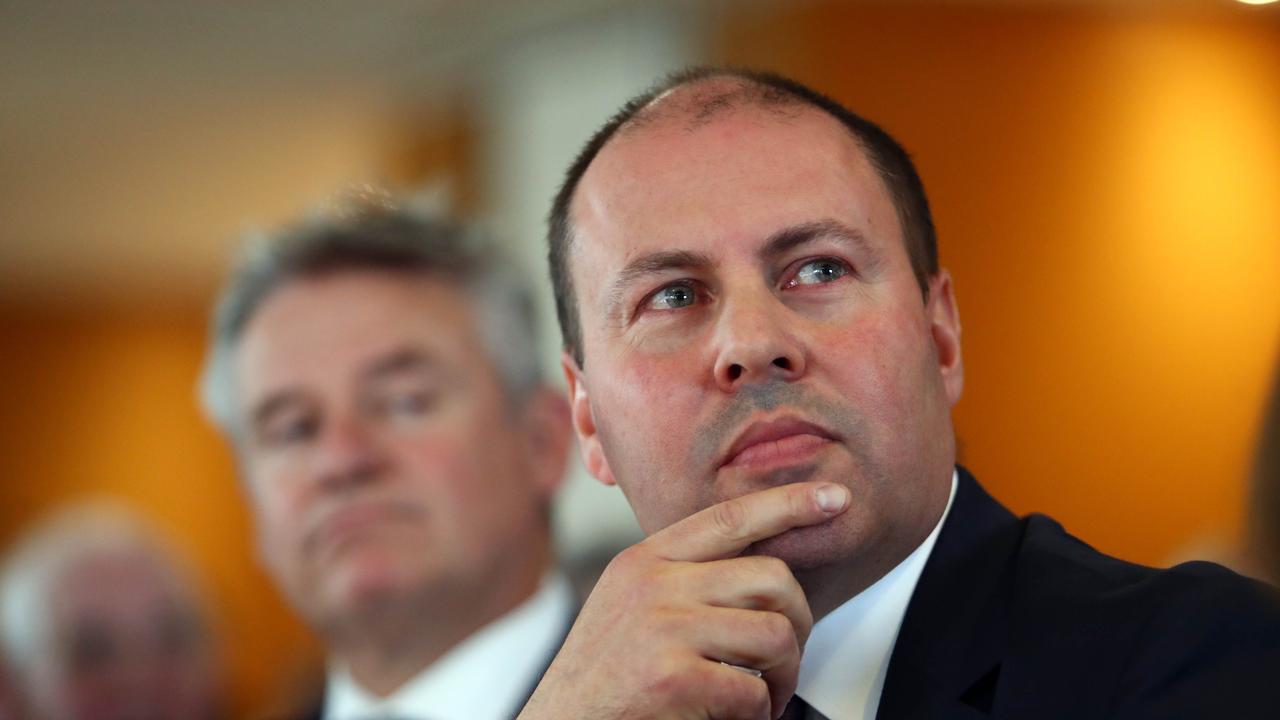Banking system isn’t broke, so don’t fix it
Attacks on our banking and coal-fired electricity generation systems share a common stupidity.
Indeed, presented with living real-time examples — banks going broke or teetering in Europe; South Australia going all ‘‘North Korea dark’’ — the attackers do either the equivalent of closing their eyes, sticking their fingers in their ears and reciting ‘‘nah, nah, nah’’, or actually, seemingly consciously, mindlessly, double down.
SA can’t function with 40 per cent wind power — except by plugging a very long extension cord into Victoria’s coal-fired stations in the Latrobe Valley; so why not take Victoria down the same path: building even more quaintly-named ‘‘turbines’’ and progressively closing down the reliable power generators?
The intention would presumably be to ‘‘double down’’ on SA’s extension cord, by building more extension cords into NSW and its coal-fired power generation. And as they close down, just build even more extension cords into Queensland. Or vice versa, if Queensland, as it currently intends to, goes first in racing back to the 18th century.
This poses the question: what’s the last extension cord going to be plugged into? When coal-fired generation has been wound back everywhere across Australia? And it’s going to have to be a pretty big one, to boot, feeding the lights of 30 million or more Australians by then?
The stupidity in relation to the banks plays out somewhat differently, but at core it’s exactly the same. We have a banking system that works, so let’s fundamentally change it, throwing us all into, well, the (financial) dark.
The absolute foundation of our economy and indeed our civilisation is power that is plentiful, reliable and cheap. Unless you can turn the most basic light switch on, can afford to turn it on, nothing and I mean nothing in our society can function.
The only form of generation that delivers power that is plentiful, reliable and cheap is coal-fired. So called renewable energy and in particular wind does not. It is not cheap, it is not reliable and it is self-evidently not ‘‘plentiful’’: there are too many hours in the average day when ‘‘the wind don’t blow’’.
In a similar way, a well-functioning financial system which has secure banks at its core — providing financial services that are also ‘‘plentiful, reliable and cheap’’ — is the sine qua non of the modern economy.
If coal-fired power generation is the skeleton of the society’s ‘‘body’’, then our efficient and safe financial system should be seen as the circulatory system.
For we have such a financial system: we have those banks. Just as we tamper with our core power generation at our peril, so also would we with our banks. One could almost literally say: if they’re not broke, don’t try to fix them. That’s the route to ensuring they will be ‘‘broke’’.
This is self-evidently not to claim they are perfect, that they haven’t mistreated many customers. Is it to caution against misdirected rectification of their failings. It is to even more emphatically caution against undermining the foundation of something so critical to a functioning economy.
The power generation issue should be simple. Coal-fired power works; other than no-longer ‘‘green’’ hydro, so-called renewable generation does not. And even hydro stops working when you run out of ‘‘high’’ water.
If you want reliable power, you must have coal-fired power stations — on the not unreasonable assumption we are never going to have nuclear.
If you want instead ‘‘renewable’’ generation, you are accepting you will go ‘‘North Korea dark’’ at regular intervals. You are consciously choosing to go back to an 18th century future of life that would be ‘‘nasty, brutish and shorter’’.
There’s even less prospect of acceptance, far less understanding of the only slightly more complex issue of banks.
Again, it should be simple. Banks borrow on the one hand and lend on the other. The interest rate they pay on the first has to be lower than the rate received on the second to cover the cost of doing that.
Banks also provide other services; provision of those services entails costs; banks recoup those costs with a mix of fees and from the interest margin between their borrowing and their lending.
Banks also need capital to provide customers with confidence in their security and as a buffer against loans going bad. To attract that capital, they have to generate a profit out of which they pay dividends.
The system we have evolved, balancing a, say, $1 trillion balance sheet on maybe $70 billion of capital, is just as much a triumph of engineering as a modern coal-fired power station. It delivers cheaper financial services (a smaller interest margin), reliably and plentifully and with consumer confidence.
A key element in this is the taxpayer guarantee. But this is not some ‘‘free gift’’ to the banks, but to the bank customers. Take it away and banking would become more expensive, less reliable and less plentiful.
This is because you would either have to reduce that balance sheet to a much smaller figure, or dramatically increase the amount of capital required. Again, the parallel with energy is acute, eerie and prophetic.
Meddling with, or worse dismantling, key components of our banking system would be the equivalent of the switch from coal-fired generation to wind. It would be ditching what works to embrace what doesn’t.
In both cases the cost and the consequent pain is not imposed on power stations owners or bank shareholders but on you.







The attacks on our banking and coal-fired electricity generation systems share a common stupidity that is almost bewildering in its comprehensiveness. The attacks and the attackers deny facts, history and even the most basic reality.